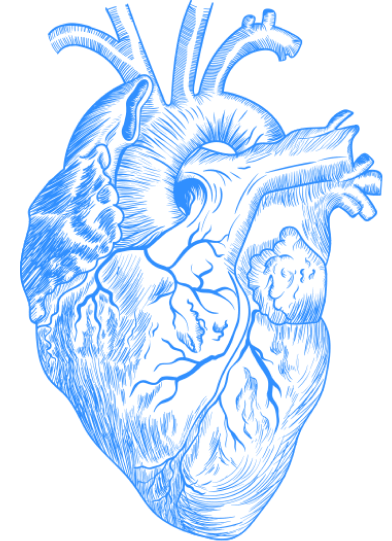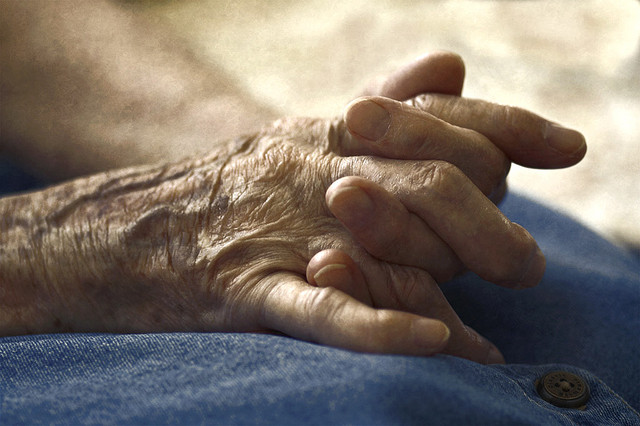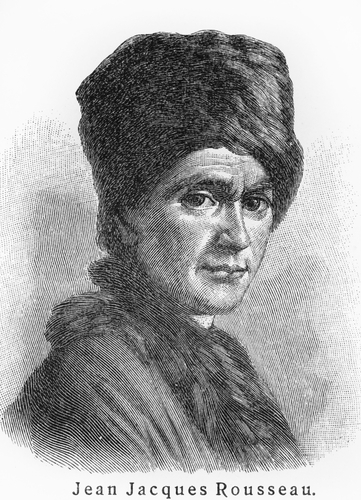
“You’ll h-h-h-have to… excuse m-m-m-me. I’m a little slow because I had a stroooooke,” he told us before we explained to him what his wife’s treatment would be. His voice was nasal and his speech deliberate as he slowly and poorly enunciated each word. He wore sweatpants and a long-sleeved shirt with a blue and white hat pulled down over his eyes. Stubbornly refusing to stay tucked away, gray hairs peeked out the sides of his chapeau and covered his ears. He looked to be in his seventies. His wife lay on the bed in a hospital gown, slippers still on. She wore a winter hat that concealed a bald scalp, one of the many side effects of potent cancer medications. Her eyebrows were gone and her sinewy frame was exaggerated as cachexia set in. She needed extra rounds of chemotherapy for metastatic cancer.
 |
| Image via Flickr: Tim Hamilton (CC) |
That afternoon, I ran into the husband in the hospital lobby. He had just bought food and was going to bring it back to his wife, but he was heading the wrong way. He asked a fellow student and me (he recognized both of us) how he could get back to his wife’s room and we pointed him in the right direction. We watched him shuffle towards his wife in the cancer ward. This couple was neither wealthy nor well-educated; they were suffering and attempting to navigate the healthcare system as well as the overwhelming size of an academic hospital. They seemed helpless together.
It’s in such moments, as in many others, when empathy wells up in medical practice. I could clearly imagine myself or my family members in their position. Their emotions became all too familiar and upsetting to me. I wanted to do everything in my power to help them and to fix their situation. But this strong sense of identification seemed odd given how brief my interaction with them had been.
In reality, however, such a feeling is not so unusual. Robert Louis Stevenson, the famous nineteenth-century Scottish writer, co-authored a short story called The Ebb-Tide. It is an account of three criminals who steal a ship and the deeply troubling moral situation they subsequently encounter. When one of them falls sick, Stevenson describes the healthy comrades’ feelings:
A profound commiseration filled them, and contended with and conquered their abhorrence. The disgust attendant on so ugly a sickness magnified this dislike; at the same time, and with more than compensating strength, shame for a sentiment so inhuman bound them the more straitly to his service; and even the evil they knew of him swelled their solicitude, for the thought of death is always the least supportable when it draws near to the merely sensual and selfish.
 |
| Image via Shutterstock |
Given the power of this selfless commiseration shouldn’t we cultivate it in medicine? No doubt it will help us to act altruistically even when we see the worst in patients or colleagues, thus leading to a better bedside manner and better patient care. Jean-Jacques Rousseau, the Genevan philosopher, saw such feelings differently, however. In Emile, or On Education, Rousseau points out that empathy is really an outlet for selfish passions, even if its effects can be positive. Rousseau writes that,
if the enthusiasm of an overflowing heart identifies me with my fellow-creature, if I feel, so to speak, that I will not let him suffer lest I should suffer too, I care for him because I care for myself, and the reason of the precept is found in nature herself, which inspires me with the desire for my own welfare wherever I may be.
Such cynicism about the underlying nature of empathy still has its advocates today. In the September 2014 Boston Review, Yale psychology professor Paul Bloom questions our high regard for empathy. I recommend reading his essay and his exchange with other scholars, including Peter Singer, Sam Harris, and Leslie Jamison. Bloom points out the dangers of unchecked empathy: “Strong inclination toward empathy comes with costs. Individuals scoring high in unmitigated communion report asymmetrical relationships, where they support others but don’t get support themselves. They also are more prone to suffer depression and anxiety.” And this is especially the case, Bloom points out, in the medical field in which a doctor can lose a sense of objectivity and a cool head in an emergency. Bloom distinguishes between cognitive empathy, which is empathy tempered by rational feeling, and emotional empathy, which can be dangerous. Bloom writes of an older relative of his in the hospital:
He values doctors who take the time to listen to him and develop an understanding of his situation; he benefits from this sort of cognitive empathy. But emotional empathy is more complicated. He gets the most from doctors who don’t feel as he does, who are calm when he is anxious, confident when he is uncertain. And he particularly appreciates certain virtues that have little directly to do with empathy, virtues such as competence, honesty, professionalism, and respect.
This makes sense. I can imagine how exhausting it must be to feel so strongly about every patient. It would cause burnout and depression. But the psychologists Lynn O’Connor and Jack Berry respond to Bloom in the following way: “We can’t feel compassion without first feeling emotional empathy. Indeed compassion is the extension of emotional empathy by means of cognitive processes. Only if we have the capacity to feel empathy toward loved ones can this sentiment be generalized by the imagination and extended to strangers.” This addition to Bloom’s argument is absolutely vital. Both types of empathy are important.
Such balanced empathy keeps the physician honest. There are many times when, in a rush to complete the work of the day or under the pressure to see every patient, physicians take their frustrations out on patients. Empathy tames our impulsivity and gives us pause. It forces us to consider the actions we are about to take. And we can project empathy using reason and emotion. If an elderly woman is being difficult, instead of reacting with frustration and annoyance we can step back and ask ourselves, “What if is this were my grandmother or my mother? How would I want her physician to behave?” To do this is not easy, but it can make an immense difference in how one interacts with a patient.
Empathy may or may not spring from selfishness, and too much of one aspect of it (like too much of any emotion) can be a bad thing. But physicians do need empathy, both the emotional empathy that we feel towards some and the cognitive empathy that we can extend toward all. In the cogs of an impersonal medical system, it leads to the dignified treatment of a suffering patient.
